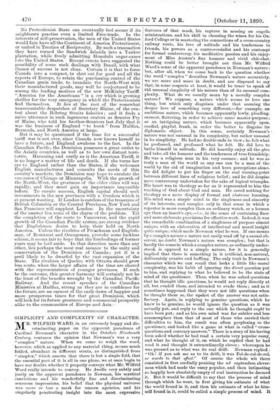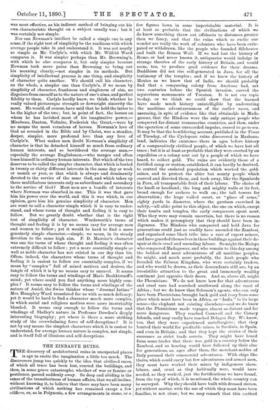SIMPLICITY AND COMPLEXITY OF CHARACTER. features of that mask, his
rapture in musing on angelic ministrations, and his "skill in choosing the wines for his Ox- ford College or in mastering the connections of a crosipcountry railway route, his love of solitude and his tenderness to friends, his powers as a controversialist and his contempt for formal controversy, his meditative passion and his enjoy- ment of Miss Austen's fine humour and vivid chit-chat. Nothing could be better brought out than Mr. Wilfrid Ward's sense of the apparent paradoxes in Newman's nature ; but, after all, when we come back to the question whether the word " complex " describes Newman's nature accurately, we are more and more in doubt, and are disposed to say that, in some respects at least, it would be truer to speak of the unusual simplicity of his nature than of its unusual com- plexity. What do we usually mean by a morally complex nature ? We suppose, a nature which seems to love one thing, but which only disguises under that seeming the deeper love of something very different,—for example, an ambitious nature, which becomes apparently lowly, pleading, earnest, flattering, in order to achieve some master-purpose ; or an intriguing nature, which becomes apparently open, cordial, playful, frank, in order the better to disguise its diplomatic object. In this sense, certainly Newman's - nature was not unusual in its complexity, but rather unusual in its simplicity. He had no double ends in view ; he felt what he professed, and professed what he felt. He did love to bathe himself in solitude. He did heartily enjoy all the give and take, all the humour and the tenderness of true friendship. He was a religious man in his very essence; and he was as truly a man of the world as any one can be a man of the world by the aid of imagination and keen perceptions alone. He did delight to put his finger on the real turning-point between different lines of religious belief ; and he did despise mere controversy undertaken for the sake of logical triumphs. His heart was in theology so far as it represented to him the teaching of God about God and man. He cared nothing for theology as a mere display of formal and abstruse learning.• His mind was a simple mind in the singleness and sincerity of its interests, and complex only in that sense in which a repeater is more complex than an ordinary watch, or a human eye than an insect's eye,—i.e., in the sense of containing finer and more elaborate provisions for effective work. Indeed, it was the remarkable combination of a singleness of purpose almost unique, with an elaboration of intellectual and moral insight quite unique, which made Newman what he was. If one means by a complex nature a nature not easily read off by a casual ob- server, no doubt Newman's nature was complex ; but that is hardly the sense in which a complex nature, as ordinarily under- stood, is opposed to a simple nature, for it is generally implied that there is something in it artificial, non-natural, deliberately evasive and baffling. The only trait in Newman's character which we can recall that looks a little like moral complexity, was his habit of ignoring the direct question put to him, and replying to what he believed to be the state of mind of the questioner. Thus, when he was asked questions that he thought idle questions, he would not reply directly at all, but evaded them, and intended to evade them ; and as it sometimes happened that they were not idle questions when he thought them so, the upshot of the answer was not satis- factory. Again, in replying to genuine questions, which he knew to be genuine, he would ignore the question as it was actually put, and reply to the one which he thought ought to have been put; and as his own mind was far subtler and less commonplace than that of most of those who carried their difficulties to him, the result was often perplexing to the questioner, and looked like a game at what is called " cross- questions and contrary answers." There is a story of his having been asked whether he had read a certain very popular essay, and what he thought of it, on which he replied that he had read it and thought it extraordinarily clever ; whereupon he was pressed as to what was its real drift. Newman replied : " Oh ! if you ask me as to its drift, it was Fol-de-rol-de-rol, or words to that effect." Of course the whole wit there consisted in first cordially praising the ad captandum clever- ness which had made the essay popular, and then intimating so happily how absolutely empty of real instruction he deemed it. But it would be difficult to say that the 'process of mind through which he went, in first giving his estimate of what the world found in it, and then his estimate of what he him- self found in it, could be called a simple process of mind. It
was most effective, as his indirect method of bringing out his own characteristic thought on a subject usually was ; but it was certainly not simple.
Nor can Newman's intellect be called a simple one in any sense, if the right test of simplicity be the readiness with which average people take in and understand it. It was not nearly so simple as Mr. Carlyle's, with which Mr. Wilfrid Ward compares it. It was simpler perhaps than Mr. Browning's, with which he also compares it, but only simpler because Newman took more pains than Browning to bring out his meaning clearly,—not simpler in its methods. But simplicity of intellectual process is one thing, and simplicity of character quite another. We should call his character, on the whole, a simpler one than Carlyle's, if we mean by simplicity of character, frankness and singleness of aim, no disguises from oneself as to the nature of one's aims, and perfect fidelity to them. Carlyle hardly knew, we think, whether he really valued picturesque strength or downright sincerity the most. He would, of course, have said that he held the latter to be the higher of the two ; but, in point of fact, the heroes on whom he has lavished most of his imaginative power,— Mirabeau, Danton, Voltaire, Frederick the Great,—were by no means the most veracious of heroes. Newman's love of God as revealed in the Bible and by Christ, was a steadier, deeper, simpler, more profound love than any love of Carlyle's. What makes men doubt Newman's simplicity of character is that he detached himself so much from ordinary human interests, and so bewildered the average man,— especially the average Englishman,—who merges and often loses himself in ordinary human interests. But which of the two deserves to be called the simpler character, that which is buried in twenty or thirty different interests in the same day or week or month or year, or that which is always and dominantly devoted to the service of the same God, and which takes up these multifarious interests only as subordinate and secondary to the service of God Most men are a bundle of interests where Newman was absorbed in one. This it was that gave him his power over the world, and this it was which, in our opinion, gave him his genuine simplicity of character. Men are wont to call a character simple which it is easy to under- stand, and whose turns of thought and feeling it is easy to follow. But we greatly doubt whether that is the right test of simplicity of character. Wordsworth's turns of thought and feeling it is by no means easy for average men and women to follow ; yet it would be hard to find a more genuinely simple character,—simple, we mean, in its steady devotion to the same high aim. F. D. Matnice's character was one the turns of whose thought and feeling it was often extremely difficult to follow ; yet a more essentially simple as well as noble character has not existed in our day than his. Often, indeed, the characters whose turns of thought and feeling it is easiest to follow are essentially complex, if we mean by " complex " full of mixed motives and desires, the tangle of which it is by no means easy to unravel. It seems easy to follow the turns and windings of Marie Bashkirtseff's mind ; yet where could you find anything more highly com- plex? It seems easy to follow the turns and windings of the nature of Amiel, the Swiss thinker whose "Journal Intime " Mrs. Humphry Ward translated for us with so much delicacy; yet it would be hard to find a character much more complex, in which social and religious motives were more inextricably blended. It seems easy enough to follow the turns and windings of Shelley's nature in Professor Dowden's deeply interesting biography ; yet where is there a more striking study of the overwhelming force of self-deceptions? It is not by any means the simplest characters which it is easiest to understand, for average human nature is complex, not simple, and is itself full of illusions and self-deceptions.



















































 Previous page
Previous page